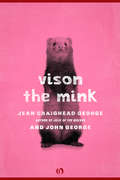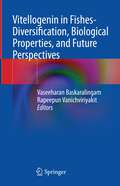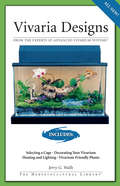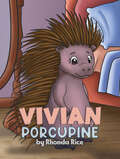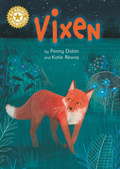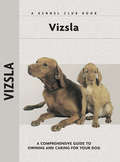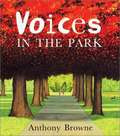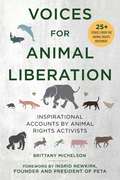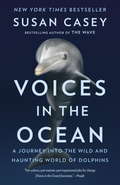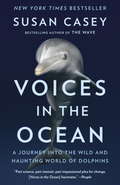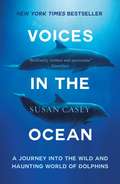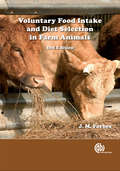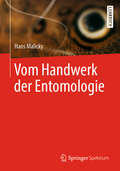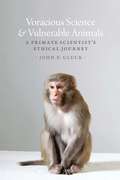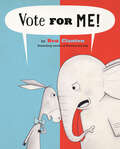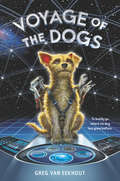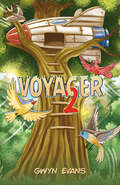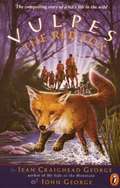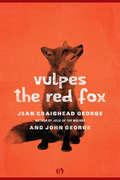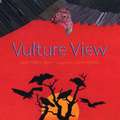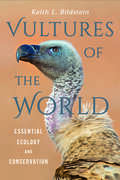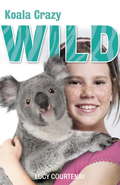- Table View
- List View
Vison, the Mink
by John George Jean Craighead GeorgeVison the mink, the bully of his litter, strikes out on his own after the sudden death of his mother Vison the mink has fought for everything--food, shelter, survival--almost from birth. The largest of his litter, he bullied his smaller sisters and was the first to venture out of the den. Returning home after hunting one day, Vison and his mother are cornered by Urocyon the gray fox. With no way out, Vison's mother attacks the fox with full force, allowing Vison to escape. Back in the den, the mink kits wait for their mother, but she does not return. Bored with his weak sisters, Vison abandons them and leaves the den for good. But his mother still had much left to teach her kits about life in the wilderness. Has Vison learned enough to survive? This ebook features an illustrated biography of Jean Craighead George, including rare photos from the author's personal collection.
Vitellogenin in Fishes- Diversification, Biological Properties, and Future Perspectives
by Vaseeharan Baskaralingam Rapeepun VanichviriyakitThis book provides basic and advanced information on vitellogenin in fish. The proposed book discusses the history of vitellogenin, previtellogenesis, their diversification and classification in fishes, and tools for their identification and characterization. Further, their functional aspects in oogenesis and its regulatory mechanism, role as the immunocompetent molecule, and reproductive strategies are discussed. The book further examines vitellogenin as a hormone and biomarker, its related egg yolk proteins, and its mechanism on molecular cloning and induction. In addition, the book discusses its role in the disruption of the endocrine system in fish, its biological activities, its multivalent mechanism in marine and freshwater fishes, and its impact on the growth of ornamental fishes. Moreover, this book elaborates on the multiple vitellogenin genes, each with unique promoter regions and varying sensitivity to induction by estradiol, and multiple Vtg proteins themselves, with variable degrees of post-translational modification. As such, this book is helpful for researchers and students interested in the reproduction of fishes and reproductive biology.
Vivaria Designs
by Jerry G. WallsVivaria Designs is one reptile book from the highly acclaimed Advanced Vivarium Systems series. The AVS series, founded and guided by herpetocultural pioneer Philippe de Vosjoli, is the #1 series on reptile care. From choosing a pet to selecting a veterinarian to feeding, housing, breeding, and more, these books deliver the most helpful and up-to-date information available on popular reptiles and amphibians kept as pets.
Vivian Porcupine
by Rhonda RiceDo you ever wish you had brown hair instead of blond, blue eyes instead of green, or were shorter instead of taller? Vivian thought she wanted to change something about herself, so she gave her quills to all of her friends. They were all very creative when they put them to use. Some used them for a favorite hobby, some were used in sports, some for cleaning and gardening and others used them for their favorite pastime. It made Vivian happy that her friends could use the quills, but she also had to make herself feel happy. She changed back to the Vivian that she loved and was most comfortable. She even looked like a porcupine again!
Vixen: Independent Reading Gold 9 (Reading Champion #653)
by Penny DolanThis story is part of Reading Champion, a series carefully linked to book bands to encourage independent reading skills, developed with Dr Sue Bodman and Glen Franklin of UCL Institute of Education (IOE)Vixen's den is in the garden of an old house. And she has a very special reason to hide away there this summer ...Reading Champion offers independent reading books for children to practise and reinforce their developing reading skills.Fantastic, original stories are accompanied by engaging artwork and a reading activity. Each book has been carefully graded so that it can be matched to a child's reading ability, encouraging reading for pleasure.
Vizsla
by Isabelle Francais Patricia Peters Renee Low Robert L. WhiteThe experts at Kennel Club Books present the world's largest series of breed-specific canine care books. Each critically acclaimed Comprehensive Owner's Guide covers everything from breed standards to behavior, from training to health and nutrition. With nearly 200 titles in print, this series is sure to please the fancier of even the rarest breed!
Voices In The Park
by Anthony BrowneDifferent characters tell the same story from their own perspectives in this timeless children's story book, which explores the themes of alienation, friendship, and the bizarre amid the mundane. <P><P> Four people enter a park, and through their eyes we see four different visions. There's the bossy woman, the sad man, the lonely boy, and the young girl whose warmth touches those she meets. As the story moves from one voice to another, their perspectives are reflected in the shifting landscape and seasons. <P> This is an intriguing, multi-layered, enormously entertaining book that demands to be read again and again. A Family Life Critic's Choice Award winner, Voices in the Park uses radically different perspectives to give fascinating depth to an otherwise simple story.
Voices for Animal Liberation: Inspirational Accounts by Animal Rights Activists
by Brittany MichelsonImmerse yourself in the world of animal rights protests, campaigns, demonstrations, outreach, rescue, and so much more. In today&’s world, voices of the marginalized are in the spotlight and people across the globe are recognizing animal rights as a social justice movement. During a time of historic actions and victorious campaigns, Voices for Animal Liberation depicts the full spectrum of animal rights activism that is currently at work to create change. This book offers the words of both new and highly influential voices in the movement today, with the intention of inspiring and educating those who are sparked by the vision of a more ethical world. Including a foreword by Ingrid Newkirk, founder and president of PETA and arguably one of the most prolific figures in the animal rights movement, other contributors include: Jasmine Afshar, army veteranChase Avior, actor and filmmakerGene Baur, founder of Farm SanctuaryDotsie Bausch, Olympic medalist and founder of Switch4GoodAlex Bez, founder and director of Amazing Vegan OutreachMatthew Braun, former investigator of farms and slaughterhousesSaengduean Lek Chailert, founder of Save Elephant FoundationAmy Jean Davis, founder of Los Angeles Animal SaveKaren Davis, founder of United Poultry ConcernsSean Hill, award-winning multidisciplinary artist and humanitarianWayne Hsiung, cofounder of Direct Action Everywhere (DxE)Gwenna Hunter, event coordinator for Vegan Outreach and founder of Vegans of LAAnita Krajnc, founder of the Save MovementCory Mac a&’Ghobhainn, organizer with Progress for ScienceJo-Anne McArthur, photographer and founder of We Animals MediaZafir Molina, truth seeker and movement artistShaun Monson, documentary filmmakerAlexandra Paul, actress and cohost of Switch4GoodBrittany Peet, Director of Captive Animal Law Enforcement for PETAJill Robinson, founder and CEO of Animals AsiaZoe Rosenberg, founder of Happy Hen Animal SanctuaryDani Rukin, citizen journalist for JaneUnchained NewsJasmin Singer, cofounder of Our Hen House and Senior Features Editor for VegNewsKathy Stevens, founder of Catskill Animal SanctuaryNatasha & Luca, &“That Vegan Couple,&” social media influencersWill Tuttle, visionary author and speakerGillian Meghan Walters, creator of MummyMOO project Connect with activists from different backgrounds as they reveal their perspectives on animal rights, their experiences taking action for animals, the challenges they've faced, and the meaning of activism in their lives.
Voices in the Ocean
by Susan CaseyFrom Susan Casey, the New York Times bestselling author of The Devil's Teeth and The Wave, a breathtaking look into the mysterious world of dolphins and their conflicted history with man. Since the dawn of recorded history, humans have felt a kinship with the sleek and beautiful dolphin, an animal whose playfulness, sociability and intelligence seems like an aquatic mirror of mankind. In recent decades, scientists have discovered dolphins recognize themselves in reflections, count, feel despondent, adorn themselves, rescue each other (and humans), deduce, infer, form cliques, throw tantrums, gossip and scheme. Several native peoples trace their lineage to dolphins. They are the stars of multi-million dollar aquatic theme parks, money which has fueled a sinister illicit trade as shown in the documentary Blackfish. The U.S. Navy has a secret program using dolphins as undersea soldiers. The theory that they are a superior, extraterrestial species is popular among the new age fringe. They are the victims of brutal slaughters as depicted in the documentary The Cove. To swim with a dolphin is a transporting experience, an encounter with a being seemingly so like us, yet so alien. No writer is better positioned to portray these magical creatures than Susan Casey, whose combination of personal reporting, intense scientific research, and evocative prose made The Wave and The Devil's Teeth contemporary classics of writing on the oceans. For two years Casey traveled the world, and has written a thrilling book about the other intelligent life on the planet.
Voices in the Ocean
by Susan CaseyFrom Susan Casey, the New York Times bestselling author of The Wave and The Devil's Teeth, a breathtaking journey through the extraordinary world of dolphins Since the dawn of recorded history, humans have felt a kinship with the sleek and beautiful dolphin, an animal whose playfulness, sociability, and intelligence seem like an aquatic mirror of mankind. In recent decades, we have learned that dolphins recognize themselves in reflections, count, grieve, adorn themselves, feel despondent, rescue one another (and humans), deduce, infer, seduce, form cliques, throw tantrums, and call themselves by name. Scientists still don't completely understand their incredibly sophisticated navigation and communication abilities, or their immensely complicated brains. While swimming off the coast of Maui, Susan Casey was surrounded by a pod of spinner dolphins. It was a profoundly transporting experience, and it inspired her to embark on a two-year global adventure to explore the nature of these remarkable beings and their complex relationship to humanity. Casey examines the career of the controversial John Lilly, the pioneer of modern dolphin studies whose work eventually led him down some very strange paths. She visits a community in Hawaii whose adherents believe dolphins are the key to spiritual enlightenment, travels to Ireland, where a dolphin named as "the world's most loyal animal" has delighted tourists and locals for decades with his friendly antics, and consults with the world's leading marine researchers, whose sense of wonder inspired by the dolphins they study increases the more they discover. Yet there is a dark side to our relationship with dolphins. They are the stars of a global multibillion-dollar captivity industry, whose money has fueled a sinister and lucrative trade in which dolphins are captured violently, then shipped and kept in brutal conditions. Casey's investigation into this cruel underground takes her to the harrowing epicenter of the trade in the Solomon Islands, and to the Japanese town of Taiji, made famous by the Oscar-winning documentary The Cove, where she chronicles the annual slaughter and sale of dolphins in its narrow bay. Casey ends her narrative on the island of Crete, where millennia-old frescoes and artwork document the great Minoan civilization, a culture which lived in harmony with dolphins, and whose example shows the way to a more enlightened coexistence with the natural world. No writer is better positioned to portray these magical creatures than Susan Casey, whose combination of personal reporting, intense scientific research, and evocative prose made The Wave and The Devil's Teeth contemporary classics of writing about the sea. In Voices in the Ocean, she has written a thrilling book about the other intelligent life on the planet.From the Hardcover edition.
Voices in the Ocean: A Journey into the Wild and Haunting World of Dolphins
by Susan CaseyThrough dolphins, we can see the best and worst of mankind.On average, seventy four dolphins wash up on the Gulf of Mexico's north shore every year. In the first half of 2012, there were eight hundred and ninety-one of them, with stillborn baby dolphins washing up at ten times the average yearly rate. The cause? BP's disastrous oil spill in 2010.For decades mankind's actions have led to the deaths of thousands of these beautiful creatures and this continues now, at a time when we know more about them than we ever have before. We know about their intelligence, abilities, and their culture. We know how similar to us they really are.In her most provocative book yet, Susan Casey takes us into an underwater world that is similar to our own in ways no other animal's world is. We're at a crossroads now where we could end up destroying these beautiful creatures, and our relationship with nature has become so dysfunctional that it jeopardizes our own existence. By combining her own personal narrative with her in-depth scientific research, Casey delivers a narrative which is both compassionate and thrilling.
Voluntary Food Intake and Diet Selection in Farm Animals (2nd edition)
by J. M. ForbesThe feeding of farm animals directly effects their growth, health, reproduction and ultimately their economic value and is consequently one of the most studied areas of animal science. Building on the first edition and its predecessor, The Voluntary Food Intake of Farm Animals, Forbes has produced an up-to-date and more focused examination of developments in the understanding of voluntary food intake and new ideas and studies relating to diet selection. Chapters have been reorganized and updated to provide a more streamlined approach.
Vom Handwerk der Entomologie
by Hans MalickyDieses Buch wendet sich an entomologische Amateure und an Studierende und Forschende an Universitäten. Es bietet eine Zusammenfassung der grundlegenden Gedanken und Handgriffe, die eine Basis für die Beschäftigung mit der Entomologie bilden. Der Autor verknüpft in konkurrenzloser Weise übliche Arbeitsweisen der Amateurentomologen mit Anleitungen zur wissenschaftlichen Arbeit in diesem Gebiet. Das Werk vermittelt Kenntnisse für die taxonomische Tätigkeit und unterstützt bei der praktischen Arbeit.
Voracious Science & Vulnerable Animals: A Primate Scientist's Ethical Journey (Animal Lives Ser.)
by John P. GluckThe National Institute of Health recently announced its plan to retire the fifty remaining chimpanzees held in national research facilities and place them in sanctuaries. This significant decision comes after a lengthy process of examination and debate about the ethics of animal research. For decades, proponents of such research have argued that the discoveries and benefits for humans far outweigh the costs of the traumatic effects on the animals; but today, even the researchers themselves have come to question the practice. John P. Gluck has been one of the scientists at the forefront of the movement to end research on primates, and in Voracious Science and Vulnerable Animals he tells a vivid, heart-rending, personal story of how he became a vocal activist for animal protection. Gluck begins by taking us inside the laboratory of Harry F. Harlow at the University of Wisconsin, where Gluck worked as a graduate student in the 1960s. Harlow’s primate lab became famous for his behavioral experiments in maternal deprivation and social isolation of rhesus macaques. Though trained as a behavioral scientist, Gluck finds himself unable to overlook the intense psychological and physical damage these experiments wrought on the macaques. Gluck’s sobering and moving account reveals how in this and other labs, including his own, he came to grapple with the uncomfortable justifications that many researchers were offering for their work. As his sense of conflict grows, we’re right alongside him, developing a deep empathy for the often smart and always vulnerable animals used for these experiments. At a time of unprecedented recognition of the intellectual cognition and emotional intelligence of animals, Voracious Science and Vulnerable Animals is a powerful appeal for our respect and compassion for those creatures who have unwillingly dedicated their lives to science. Through the words of someone who has inflicted pain in the name of science and come to abhor it, it’s important to know what has led this far to progress and where further inroads in animal research ethics are needed.
Vote For Me!
by Ben ClantonA hilarious political satire by the creator of the bestselling Narwhal and Jelly series.Hey, you! Yes, you with the dazzling smile! The donkey wants your vote. So does the elephant. And each will do just about anything to win your support. Brag? Sure! Flatter? Absolutely! Exaggerate, name-call, make silly promises and generally act childish? Yes, yes, yes and yes. Soon, the tension mounts, and these two quarrelsome candidates resort to slinging mud (literally) and flinging insults. And what happens when the election results are in? Well, let's just say the donkey and the elephant are in for a little surprise--and a certain bewhiskered, third-party candidate is in for a first term!
Vote for Me!
by Martin BaltscheitThe lion loves elections—he wins every time. But when the mouse decides to run for president, other animals offer up their own candidates. Each one has a cause to champion: the ant wants a busier schedule, the German shepherd wants more law and order, and the wildebeest just wants everyone to live in peace. With so many options, how can the animals ever decide? Amusingly told through vibrantly colored illustrations, Vote for Me! introduces readers to the wild process of selecting a good leader.
Voyage of the Dogs
by Greg Van EekhoutThis edge-of-your-seat action-packed story is Homeward Bound—set in space! SOS. Ship damaged. Human crew missing.We are the dogs. We are alone.Lopside is a Barkonaut—a specially trained dog who assists human astronauts on missions in space. He and the crew aboard the spaceship Laika are en route to set up an outpost on a distant planet.When the mission takes a disastrous turn, the Barkonauts on board suddenly find themselves completely alone on their severely damaged ship.Survival seems impossible. But these dogs are Barkonauts—and Barkonauts always complete their mission.
Voyager 2
by Gwyn EvansJoin Tod the squirrel and his woodland friends on an exciting adventure as they build their very own spaceship-shaped treehouse! With the help of their new neighbours, the weasel brothers Sammy and Jimmy, they paint their creation in vibrant red, blue, and silver. But the fun doesn't stop there – a wise old raven named Zander takes the friends on thrilling flights through the sky. Filled with laughter, friendship, and colourful illustrations, Voyager 2 is a delightful tale that will spark the imagination of young readers as they follow these lovable characters on their quest to build the treehouse of their dreams.
Vulpes the Red Fox (American Woodland Tales)
by John George Jean Craighead GeorgeVulpes was the pride of his parents, the smartest pup of the litter--and he grew into a fast, quick-witted red fox whose abilities became legend among the forest's hunters.
Vulpes, the Red Fox
by John George Jean Craighead GeorgeVulpes the red fox is quick, curious, and clever--but is he any match for humans? Vulpes the red fox is the cleverest and boldest kit in his litter. From an early age, his curiosity has driven him to explore the woods and waterways around the Potomac River, where he was born. He watches his parents, especially his father, a fearless hunter, and quickly learns how to survive. One day, he smells a new and unfamiliar animal. As two boys come up through the woods, Vulpes is snatched away by his mother while his father crouches in the tall grass, hidden. What creature could have frightened his brave parents so much? Vulpes decides he has to find out more. But will his curiosity cost him his life? This ebook features an illustrated biography of Jean Craighead George, including rare photos from the author's personal collection.
Vulture View
by April Pulley SayreTurkey vultures soar on the balmy air, looking for their next stinky feast. These birds don't hunt-they like their food to be already dead, and their eating habits serve a very important ecological role. Vultures are part of nature's clean-up crew. In her signature poetic, energetic style, acclaimed nature writer April Pulley Sayre introduces young readers to the world of the turkey vulture. The gorgeous illustrations by Caldecott Honor-winning artist Steve Jenkins capture these birds in all their surprising majesty.<P><P> Winner of the Theodore Seuss Geisel Honor
Vultures (Nature's Children)
by Tim HarrisWhere do vultures live? What do vultures eat? How big are vultures? Find out the answers to these questions and learn all about vultures physical characteristics, behavior, and habitats.
Vultures of the World: Essential Ecology and Conservation
by Keith L. BildsteinIn Vultures of the World, Keith L. Bildstein provides an engaging look at vultures and condors, seeking to help us understand these widely recognized but underappreciated birds. Bildstein's latest work is an inspirational and long overdue blend of all things vulture. Based on decades of personal experience, dozens of case studies, and numerous up-to-date examples of cutting-edge science, this book introduces readers to the essential nature of vultures and condors. Not only do these most proficient of all vertebrate scavengers clean up natural and man-made organic waste but they also recycle ecologically essential elements back into both wild and human landscapes, allowing our ecosystems to function successfully across generations of organisms. With distributions ranging over more than three-quarters of all land on five continents, the world's twenty-three species of scavenging birds of prey offer an outstanding example of biological diversity writ large. Included in the world's species fold are its most abundant large raptors—several of its longest lived birds and the most massive of all soaring birds. With a fossil record dating back more than fifty million years, vultures and condors possess numerous adaptions that characteristically serve them well but at times also make them particularly vulnerable to human actions. Vultures of the World is a truly global treatment of vultures, offering a roadmap of how best to protect these birds and their important ecology.
Vultures: Nature's Cleanup Crew (Fountas & Pinnell Classroom, Guided Reading Grade 4)
by Jean KnoxRecyclers with Wings Vultures provide a vital service to the world. They are nature's recyclers. By eating dead animals and garbage, these birds keep our planet clean. NIMAC-sourced textbook
WILD: Koala Crazy
by Lucy CourtenayFeaturing tiger cubs, circus bears, swimming monkeys and cute koalas - this is a must-read series for all animal lovers!Twins Tori and Taya Wild disagree about almost everything ... except for their love of animals. Which is good since their mother fosters all kinds of wild animals so their house is always full of them! And now their family has set up an 'animals on film' business their lives have become even WILDER. It was only a matter of time before Tori and Taya had their chance to be on the set of a famous music video when Taya's baby croc is selected to star on a snappy rap video ... And when the twins aren't busy with crocs, it's cute Koco the-kangeroo-loving koala bear who is grabbing their attention. When he goes missing things at Wild World get a bit koala crazy!Check out these other titles in the series: Tiger Trouble, Monkey Magic, Bear Hug
